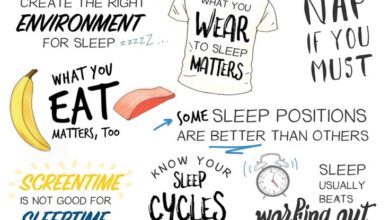
How Long Before Bed Should You Stop Eating?
How long before bed should you stop eating? It’s a question that often pops up when we’re trying to improve our sleep quality and overall health. The answer isn’t always straightforward, as it can depend on a variety of factors, including your individual metabolism, activity levels, and even the types of foods you consume.
But understanding the relationship between late-night eating and sleep, digestion, and metabolism can help us make informed choices about our eating habits and optimize our sleep patterns.
This article delves into the science behind late-night eating and its impact on our bodies. We’ll explore the digestive processes, the role of hormones, and the influence on metabolism and weight management. By understanding these factors, we can determine the optimal time to stop eating before bed and create healthy eating habits that support restful sleep and overall well-being.
The Impact of Late-Night Eating on Sleep: How Long Before Bed Should You Stop Eating

Late-night eating, often defined as consuming meals or snacks within a few hours of bedtime, can significantly disrupt your sleep patterns and negatively affect your overall sleep quality. The connection between food and sleep is complex, and indulging in a late-night feast can have a cascade of consequences for your sleep cycle.
The Relationship Between Late-Night Eating and Sleep Quality
When you eat close to bedtime, your body is still actively digesting and processing the food, which can interfere with your ability to fall asleep quickly and stay asleep throughout the night. This is because the digestive process requires energy and resources that would otherwise be directed towards sleep.
The Impact of Late-Night Eating on Sleep Latency, Sleep Duration, and Sleep Stages
- Sleep Latency:Late-night eating can increase your sleep latency, which is the time it takes to fall asleep after going to bed. This is because your body is still working on digestion, keeping your mind and body in a more alert state.
- Sleep Duration:Research suggests that late-night eating can also lead to shorter sleep duration. The digestive process can disrupt your sleep cycle, causing you to wake up more frequently during the night, ultimately reducing the total amount of sleep you get.
- Sleep Stages:Late-night eating can affect the different stages of your sleep. For example, it may reduce the amount of time you spend in deep sleep, which is essential for physical and mental restoration.
The Impact of Late-Night Eating on Sleep Disorders
- Insomnia:Studies have linked late-night eating to an increased risk of insomnia, a sleep disorder characterized by difficulty falling asleep, staying asleep, or both. This is because late-night meals can trigger the release of hormones like cortisol, which can interfere with sleep.
Most experts recommend stopping eating at least 2-3 hours before bed to avoid disrupting your sleep and potentially impacting your weight. If you’re craving a warm and comforting meal, try these 9 hearty winter soups under 360 calories for a satisfying dinner that won’t keep you up all night.
Just be sure to enjoy them a few hours before hitting the hay!
Foods That Can Negatively Impact Sleep
- High-Fat Foods:Fatty foods take longer to digest, which can keep your digestive system active and interfere with sleep.
- Spicy Foods:Spicy foods can cause heartburn and indigestion, which can disrupt your sleep.
- Sugary Foods:Sugary foods can cause blood sugar spikes and crashes, which can lead to restlessness and difficulty falling asleep.
- Caffeine and Alcohol:While not technically food, caffeine and alcohol are often consumed close to bedtime and can significantly disrupt sleep. Caffeine is a stimulant that can keep you awake, while alcohol can interfere with REM sleep, the stage of sleep associated with dreaming.
You know how they say you should stop eating a couple of hours before bed? Well, Thanksgiving is a whole different ball game. With all the delicious food, it’s hard to resist those extra bites. But if you’re looking for a way to add some visual appeal to your feast, check out this article on 5 ways to fill your thanksgiving table with color.
Of course, remember to pace yourself and leave room for dessert! After all, a little bit of indulgence is what Thanksgiving is all about.
Digestive Processes and Sleep

Digestion is a complex process that involves breaking down food into smaller molecules that your body can absorb and use for energy. This process requires significant energy and resources from your body, and it can directly impact your sleep quality.
The Impact of Digestion on Sleep
When you eat, your body diverts resources to the digestive system. This includes blood flow, energy, and various enzymes and hormones. The digestive process can take several hours, and during this time, your body is actively working to break down food, absorb nutrients, and eliminate waste.
This activity can interfere with your sleep in several ways:
- Increased Brain Activity:The digestive process triggers the release of hormones and neurotransmitters that can increase brain activity, making it harder to fall asleep or stay asleep.
- Discomfort and Pain:If you eat a heavy meal or foods that are difficult to digest, you may experience discomfort, bloating, or even pain, which can disrupt your sleep.
- Increased Body Temperature:Digestion raises your body temperature, which can make it harder to fall asleep and stay asleep. Your body naturally cools down as you fall asleep, and a higher body temperature can disrupt this process.
Hormonal Regulation of Hunger and Sleep
Two key hormones play a significant role in regulating hunger and sleep: ghrelin and leptin.
- Ghrelin:This hormone is known as the “hunger hormone.” It is produced in the stomach and signals to your brain that you are hungry. Ghrelin levels increase before meals and decrease after eating. It can also influence sleep patterns, potentially making it harder to fall asleep when levels are high.
- Leptin:This hormone is produced by fat cells and signals to your brain that you are full. Leptin levels increase after eating and decrease when you are hungry. It also plays a role in regulating sleep, promoting sleep when levels are high.
The Body’s Natural Sleep-Wake Cycle and Digestion
Your body has a natural sleep-wake cycle, also known as the circadian rhythm. This cycle is regulated by internal biological clocks and external cues like light and darkness. Digestion can affect this cycle by influencing the release of hormones that regulate sleep and wakefulness.
For example, eating late at night can disrupt your circadian rhythm, leading to sleep disturbances.
The Role of Metabolism and Weight Management
Late-night eating can significantly impact your metabolism and weight management, potentially leading to weight gain. Understanding how late-night eating affects these processes is crucial for making informed decisions about your eating habits and overall health.
Calorie Surplus and Weight Gain
The concept of calorie surplus plays a crucial role in weight gain. When you consume more calories than your body burns, the excess calories are stored as fat. Late-night eating can contribute to this calorie surplus by increasing your overall calorie intake, especially if you tend to eat high-calorie snacks or meals before bed.
For example, if you consume 2,000 calories per day but burn only 1,500 calories, the remaining 500 calories are stored as fat, leading to weight gain over time.
Hormonal Imbalance and Weight Gain
Late-night eating can disrupt the delicate balance of hormones that regulate hunger, satiety, and metabolism. When you eat close to bedtime, your body’s natural production of leptin, a hormone that signals fullness, may be suppressed. Conversely, ghrelin, the hormone that stimulates hunger, may increase.
This hormonal imbalance can lead to increased appetite and cravings, making it harder to manage your weight.
Strategies for Managing Weight
Managing weight effectively requires a multifaceted approach that includes mindful eating habits and consistent sleep patterns. Here are some strategies:
- Establish a Consistent Sleep Schedule:Aim for 7-8 hours of quality sleep each night. Consistent sleep patterns help regulate your hormones, improve metabolism, and reduce cravings.
- Avoid Eating Close to Bedtime:Give your body ample time to digest food before sleep. Ideally, finish your last meal 2-3 hours before bedtime.
- Practice Mindful Eating:Pay attention to your hunger and fullness cues. Avoid distractions while eating and savor each bite. This can help you consume fewer calories and feel more satisfied.
- Choose Nutrient-Dense Foods:Focus on consuming whole, unprocessed foods rich in nutrients. These foods provide sustained energy and help regulate your blood sugar levels.
- Stay Hydrated:Drink plenty of water throughout the day. Water can help you feel full, reduce cravings, and support your metabolism.
Recommended Timeframes for Eating Before Bed
The optimal time to stop eating before bed is a topic of ongoing debate, but general guidelines suggest a “fasting window” of at least 2-3 hours before going to sleep. This practice, known as time-restricted feeding, aligns with our natural circadian rhythm, which influences various bodily functions, including sleep, digestion, and metabolism.
Factors Influencing Recommended Timeframes
The recommended timeframe for eating before bed can vary based on individual factors such as age, activity level, and health conditions.
You know that feeling of being sluggish in the morning after a late-night snack? It’s a reminder that digestion takes time, and eating too close to bedtime can interfere with your sleep. But how long before bed should you actually stop eating?
That’s where the expertise of a registered dietitian comes in! Check out 3 surprising takeaways about being a registered dietitian to learn more about their role in helping you make informed food choices. Ultimately, the answer to the “how long before bed” question depends on your individual needs and digestive system, but a general guideline is to aim for at least 2-3 hours before hitting the hay.
- Age:Younger individuals may have faster metabolisms and require less time to digest food, while older adults may benefit from longer fasting windows.
- Activity Level:Individuals who engage in regular physical activity may need to consume food closer to bedtime to replenish energy stores.
- Health Conditions:Certain health conditions, such as diabetes or gastroesophageal reflux disease (GERD), may necessitate specific dietary recommendations.
Sample Meal Plan for Healthy Dinner
A healthy and balanced dinner that won’t interfere with sleep should focus on lean protein, complex carbohydrates, and healthy fats. Here’s an example:
- Grilled Salmon:A good source of protein and omega-3 fatty acids, which support brain health.
- Quinoa:A complex carbohydrate that provides sustained energy and is rich in fiber.
- Roasted Vegetables:A source of vitamins, minerals, and antioxidants.
Recommended Timeframes for Eating Before Bed
The following table summarizes general recommendations for eating before bed based on different factors:| Factor | Recommended Timeframe ||—|—|| Age|| Young Adults (18-30) | 2-3 hours before bed || Adults (30-60) | 3-4 hours before bed || Older Adults (60+) | 4-5 hours before bed || Activity Level|| Sedentary | 3-4 hours before bed || Moderately Active | 2-3 hours before bed || Highly Active | 1-2 hours before bed || Health Conditions|| Diabetes | 3-4 hours before bed || GERD | 2-3 hours before bed || Other Conditions | Consult with a healthcare professional |
Note:These are general guidelines and may vary based on individual needs. Consulting with a healthcare professional is recommended for personalized advice.
Tips for Healthy Eating Habits

Adopting healthy eating habits is crucial for maintaining good health and sleep quality. By making conscious choices about what and when you eat, you can optimize your digestive processes, manage your weight, and promote restful sleep.
Managing Hunger and Cravings
It’s normal to experience hunger pangs in the evening, but these can be managed with mindful strategies.
- Distinguish between true hunger and emotional eating:Before reaching for a snack, take a moment to assess whether you’re truly hungry or if you’re seeking comfort or distraction from boredom or stress.
- Practice mindful eating:Pay attention to your body’s signals of fullness and satiety. Eat slowly and savor each bite, allowing your body time to register the feeling of being satisfied.
- Engage in distracting activities:If you’re feeling hungry, divert your attention with activities like reading, listening to music, or spending time with loved ones.
Importance of Hydration
Staying hydrated is essential for overall health and can help manage hunger pangs.
- Water promotes satiety:Drinking water can help you feel fuller, which can be particularly helpful in the evening when you’re trying to resist late-night snacking.
- Water aids digestion:Adequate hydration is crucial for proper digestion and can prevent feelings of bloating or discomfort.
- Water helps regulate blood sugar:Fluctuations in blood sugar levels can contribute to cravings. Drinking water can help stabilize blood sugar levels, reducing the urge to snack.
Healthy Snack Options
If you do find yourself hungry in the evening, opt for healthy snacks that won’t disrupt your sleep.
- Fruits:Apples, bananas, berries, and oranges are good sources of vitamins, minerals, and fiber, which can help you feel full and satisfied.
- Vegetables:Celery sticks, carrots, and bell peppers provide a satisfying crunch and are low in calories.
- Nuts and seeds:Almonds, walnuts, pumpkin seeds, and sunflower seeds are rich in healthy fats, protein, and fiber. However, it’s important to consume them in moderation due to their calorie content.
- Yogurt:Plain yogurt is a good source of protein and calcium, which can help promote sleep.
Benefits of Regular Exercise, How long before bed should you stop eating
Regular exercise plays a vital role in promoting good sleep and overall well-being.
- Improved sleep quality:Physical activity can help regulate your body’s natural sleep-wake cycle, leading to better sleep quality.
- Reduced stress:Exercise can help reduce stress levels, which can contribute to better sleep.
- Weight management:Regular exercise can help you maintain a healthy weight, which is important for sleep quality and overall health.
Last Word
While the ideal time to stop eating before bed may vary, understanding the impact of late-night eating on our sleep, digestion, and metabolism can empower us to make informed choices. By incorporating mindful eating habits, regular exercise, and a consistent sleep schedule, we can optimize our bodies for restful sleep and a healthy lifestyle.
Remember, it’s not about rigid rules but about finding what works best for you and creating a balance that supports your overall well-being.






